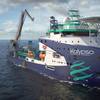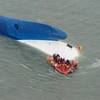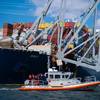Bureau Veritas says calls made at a tanker safety seminar organised by DNV in New York this week for a reduced IACS membership and claims made that only a limited number of IACS class societies were acceptable are inappropriate.
"It is complete nonsense to suggest that any three or four or five class societies can alone improve ship safety," says Bernard Anne, head of BV's
marine division. "It is also counter productive. BV has been fighting to improve the standards of all ships and all class societies, and we have
spoken out strongly for more robust ships. We believe IACS is united behind that aim, but that unity is strained, and global ship safety suffers, when members try, for commercial advantage, to portray themselves as better than others."
"Owners can think for themselves, and many, like me, can remember which society led the way in trying to convince owners to use more high tensile
steel, thus sewing the seeds of many of our problems today. I am a naval architect, and when I, in the 80's, as a shipowner, was approached by that class society, now trying to pose as leading the way to more robust ships, with the proposition that we should reduce scantlings in our newbuildings by using more high tensile steel, I refused. That meant a cost penalty for my
company, but we got the safe and robust ships we wanted. I still believe in that, and believe it should be applied by everyone, and that it can only be achieved through co-operation in IACS, not by public posing."
BV has unilaterally increased deck strength requirements for tankers in excess of levels set by other leading societies, because it believes deck buckling is a problem. "We practice what we preach, rather than just criticising others. We urge our colleagues to catch up, and we help those
who need it," says Anne. "Our new rules incorporate detailed stress and buckling criteria, detailed minimum fatigue life expectancy of critical structural details and a net scantling approach to corrosion margins. We are
happy to share our development work with others."
"Co-operation is the only way to improve safety globally," continues Anne. "We have proposed solutions to bulk carrier safety problems which might reduce risk of losses, but we cannot impose them globally, and neither can any other society. We can only make ships more robust by working together. I call on my colleagues to stop telling everyone how good they are and focus their energies instead on making ships more robust."
Sponsored Content
Chris-Marine’s solutions help to prolong engine lifetime

AST is now AST Networks, bringing you remote connectivity wherever you are

March 2024
 Read the Magazine
Read the Magazine

 Read the Magazine
Read the Magazine
This issue sponsored by:

Tip #57: Cybersecurity in Maritime Operations and Training
Subscribe for
Maritime Reporter E-News
Maritime Reporter E-News is the maritime industry's largest circulation and most authoritative ENews Service, delivered to your Email five times per week












